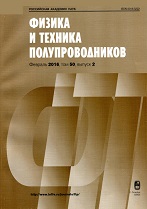|
This article is cited in 3 scientific papers (total in 3 papers)
Semiconductor physics
Influence of heat dissipation conditions on the characteristics of concentrator photoelectric modules
A. V. Andreevaa, N. Yu. Davidukb, D. A. Malevskiia, A. N. Panchaka, N. A. Sadchikova, A. V. Chekalina
a Ioffe Institute, St. Petersburg
b Federal State Budgetary Institution of Higher Education and Science Saint Petersburg National Research Academic University of the Russian Academy of Sciences, St. Petersburg
Abstract:
The results of studying the effect of various conditions of heat dissipation on heating and temperature distribution in components of concentrator photovoltaic modules are reported. The modules based on Fresnel lenses and triple-junction solar cells InGaP/GaAs/Ge mounted on copper and steel heat sinks are studied. In order to determine the thermal characteristics, we use a method, which makes it possible to measure the temperature of the $p$–$n$ junctions in the solar cells under laboratory conditions upon the simulation of thermal processes arising in the course of operation of the module under typical conditions. Further, the above temperature is used to calculate the value of the thermal resistance for a system consisting of a solar cell and the surrounding medium. The thermal processes in the module are simulated by transferring current through the solar cells in the forward-bias direction. The value of heating of the solar cells is determined by comparing the forward-voltage drops measured at the time of its rapid application or switching-off under various conditions of heat removal. The conditions of heat removal are varied using the generator's air flow.
Received: 12.09.2017
Accepted: 26.09.2017
Citation:
A. V. Andreeva, N. Yu. Daviduk, D. A. Malevskii, A. N. Panchak, N. A. Sadchikov, A. V. Chekalin, “Influence of heat dissipation conditions on the characteristics of concentrator photoelectric modules”, Fizika i Tekhnika Poluprovodnikov, 52:3 (2018), 390–394; Semiconductors, 52:3 (2018), 371–375
Linking options:
https://www.mathnet.ru/eng/phts5903 https://www.mathnet.ru/eng/phts/v52/i3/p390
|


| Statistics & downloads: |
| Abstract page: | 29 | | Full-text PDF : | 7 |
|





 Contact us:
Contact us: Terms of Use
Terms of Use
 Registration to the website
Registration to the website Logotypes
Logotypes








 Citation in format
Citation in format 
